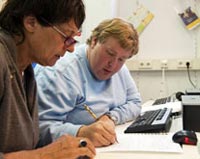Sixth Conference on Adult Education in early December in Belem (Brazil): what strategies and resources for lifelong learning?
París, 25 November

- © UNESCO/Sake Rijpkema
How do different countries guarantee the right of adults to education? How best to promote adult learning and education worldwide? Which strategies have the best prospects of succeeding? What are the different funding and incentive mechanisms? These are some of the questions to be discussed at the Sixth International Conference of Adult Education (CONFINTEA VI) in Belem (Brazil), from 1 to 4 December.
CONFINTEA VI will bring together representatives from over 156 Member States of UNESCO, other United Nations organizations, bilateral and multilateral organizations, civil society and private sector organizations as well as adult learners from all over the world. The conference aims to highlight the central role played by adult learning and education in international education and development programmes, especially those concerned with sustainable development.
The conference will be opened by Irina Bokova, Director-General of UNESCO, and Fernando Haddad, Brazil’s Minister of Education, with Alpha Oumar Konaré, former President of Mali and founder of the Mouvement pour les États-Unis d’Afrique (Movement for a United States of Africa), and Princess Laurentien of the Netherlands, UNESCO’s Special Envoy on Literacy for Development
The meeting will consist of a series of plenary sessions, committee meetings and workshops. The plenary sessions will look at a range of issues, including: Living and learning for a viable future: the power of adult learning (by Brazilian Senator, Maria Osmarina Marina Silva Vaz de Lima, 1 December); Confronting global issues (Joséphine Ouédraogo, Executive Director, Enda Tiers Monde, Senegal, 2 December); Towards lifelong learning (Kasama Varavarn, former Secretary-General of the Commission for Basic Education of Thailand’s Ministry of Education, 3 December); From rhetoric to action (Paul Bélanger, Professor of Lifelong Learning, University of Quebec, Montreal, and Chairman of the International Council for Adult Education (ICAE), 4 December). The Global Report of Adult Learning and Education (GRALE), which is based on a systematic analysis of 154 national reports, will be presented on 1 December.
GRALE documents the variety and unevenness in recent developments in policy, governance and provision in adult education. The Report shows that not many countries have specific policies in adult education, and the present funding level for adult education is way below the resources needed to allow the sector to deliver its potential. Low rates of participation and inequitable access remain the key challenges for adult education today.
Five round-table debates will bring together renowned panellists and speakers, including several ministers. They will debate the following issues: Policies and governance for adult education (2 December); Financing of adult education (2 December); Literacy as a key competence for lifelong learning (3 December); Assuring the quality of adult education and assessing learning outcomes (3 December); The way forward (4 December). A special session will be held on 1 December on the theme of Inclusion and participation in adult education. A series of workshops on the major themes of the conference will be held on 2 and 3 December by United Nations agencies, NGOs and international organizations.
After discussion in its committee meetings, CONFINTEA VI is expected to adopt the Belem Framework for Action on policies for promoting adult literacy and education.
From 28 to 30 November 2009, just before CONFINTEA VI, the ICAE will hold the International Civil Society Forum (FISC) in Belem to motivate representatives of civil society and brief them on CONFINTEA VI.
- Author(s):UNESCOPRESS
- Source:Media advisory No. 2009-68
- 25-11-2009

